|
|
|
Sort Order |
|
|
|
Items / Page
|
|
|
|
|
|
|
| Srl | Item |
| 1 |
ID:
145105


|
|
|
|
|
| Summary/Abstract |
The 70th anniversary of the signing and entry into force of the UN Charter provided an occasion to explore the historical underpinnings of contemporary global governance. This article redresses the neglect of the United Nations as a multilateral structure before the conference that drafted the Charter in 1945. It rehabilitates an underappreciated aspect of the period that began on January 1, 1942, with the “Declaration by United Nations,” namely, the combination of multilateral strategies for military and human security to achieve victory in war and peace. The wide substantive and geographic resonance suggests the extent to which the pressures of the second war to end all wars helped states to overcome their disinclination to collaborate. Today’s fashionable calls for “good enough” global governance abandon the strategy of constructing robust intergovernmental organizations; they are not good enough, especially, because our forebears did much better. Many insights and operational approaches from 1942 to 1945 remain valid for addressing twenty-first-century global challenges.
|
|
|
|
|
|
|
|
|
|
|
|
|
|
|
|
| 2 |
ID:
138302
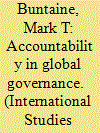

|
|
|
|
|
| Summary/Abstract |
International organizations frequently lack accountability to both states and civil society groups. States often face difficulties monitoring the actions of international organizations. Civil society groups do not often enjoy direct influence over decision-making within international organizations. To address these challenges, states have created accountability mechanisms for international organizations. Accountability mechanisms allow civil society groups to submit complaints about the performance of international organizations. They take the form of ombudsmen offices, accountability panels, and complaint procedures. Little is known about when and why these mechanisms constrain behavior by international organizations that runs counter to the mutual interests of states and civil society groups. Using the World Bank Inspection Panel as a test case, I show that monitoring by civil society groups alters lending at the World Bank when it enhances oversight by powerful states. By combining their abilities in sanctioning and monitoring, states and civil society groups can promote accountability at international organizations.
|
|
|
|
|
|
|
|
|
|
|
|
|
|
|
|
| 3 |
ID:
149069
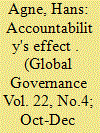

|
|
|
| 4 |
ID:
191729
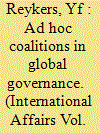

|
|
|
|
|
| Summary/Abstract |
Ad hoc coalitions (AHCs) are an indispensable but scantly conceptualized part of global governance. In recent years, several typologies and classifications of global governance arrangements have been provided, mostly differentiating them based on their organizational design features of degree of formality and membership composition. These do not capture AHCs and the role they play in global governance. In this article, we not only provide a conceptualization of AHCs, but also propose ways in which AHCs fit within the broader global governance architecture. We argue that what sets AHCs apart is not so much their (in)formality or membership, but rather their short-notice creation, their task-specific purpose and their temporarily circumscribed existence. We therefore define AHCs as autonomous arrangements with a task-specific mandate established at short notice for a limited time frame. We then develop a research agenda on the nature and future of AHCs, including their short- and long-term relationship with other multilateral arrangements in the global governance architecture. This is important, as we do yet not know how AHCs complement, compete and impact on international organizations and international crisis response.
|
|
|
|
|
|
|
|
|
|
|
|
|
|
|
|
| 5 |
ID:
133845
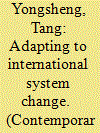

|
|
|
|
|
| Publication |
2014.
|
| Summary/Abstract |
Understanding the transition happening in the international system requires a balance between old logic and new reality. As the power pattern changes and the characteristics of international order unfold, the complications of global politics, casual relationships among different issues, and the echoing effects of strategic choices will lead to greater need for global governance. The logic of simple power politics will not be enough when strategists confront nontraditional challenges.
|
|
|
|
|
|
|
|
|
|
|
|
|
|
|
|
| 6 |
ID:
120541
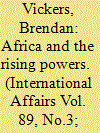

|
|
|
|
|
| Publication |
2013.
|
| Summary/Abstract |
With abundant resources and growing markets, the African continent is once again at the centre of a new 'great game of courtship' between the established and rising powers. However, compared with previous decades, African countries are no longer passive players in international relations.
This article explores Africa's recent negotiating behaviour in relation to a selected set of actors that animate the current shifting global economic order: rising powers, established powers and international organizations. Despite potential sources of bargaining leverage, most African countries (with some notable exceptions) are still reactive to the bilateral overtures of Brazil, China and India and unable to set the terms of engagement.
Nonetheless, the rise of these new powers provides alternative negotiating partners (and potentially more developmental outcomes) to the established powers. By comparison, at the multilateral level the African Group has been far more active and assertive in contesting global governance in the pursuit of greater distributive justice, particularly in the climate, trade and security regimes. This has taken place largely through the adroit use of distributive bargaining and tactics, supplemented by normative-based strategies highlighting Africa's underdevelopment.
The central argument of the article is that African countries require judicious negotiating strategies, improved deliberative capacities and coalitions with local/continental/global civil society and business networks in order to ameliorate their weaker bargaining power and reshape the terms of their engagement with their international partners, particularly the rising powers.
|
|
|
|
|
|
|
|
|
|
|
|
|
|
|
|
| 7 |
ID:
122306
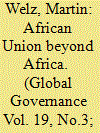

|
|
|
|
|
| Publication |
2013.
|
| Summary/Abstract |
This article explores the motives and means of the African Union and its member states for engaging in governance beyond Africa, and shows the leeway and limits the African organization faces in this regard. Two questions are at the center of the article. Is the AU successful in influencing governance beyond Africa? And what explains its success or failure? Three case studies form the article's empirical background: a study of the 2005 discussion about a reform of the UN Security Council; a study of the negotiations during the Climate Change Conference in Copenhagen in 2009; and, finally, a study of the attempt to defer the International Criminal Court's arrest warrant against Sudanese president Omar al-Bashir in 2009. The article argues that the AU can influence governance beyond Africa only if it is united, adopts realistic positions, and gains the support of more influential global players.
|
|
|
|
|
|
|
|
|
|
|
|
|
|
|
|
| 8 |
ID:
185096
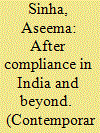

|
|
|
|
|
| Summary/Abstract |
Using India as a theory building case, this paper puts forward a theoretical framework for understanding countries’ responses to global rules and implementation effects across diverse global governance regimes and contexts. The initial premise for this paper is that the strategic structure of implementation dilemmas faced by states and actors within countries need to be understood in addition to design dilemmas. Successful global regimes must not only solve cooperation and uncertainty problems at the initial stages in choosing the right institutional matrix, but also ‘require changes in domestic institutions.’ The need to change domestic institutions creates certain implementation dilemmas. These dilemmas are a joint product of the institutional design, specific policy issue and the domestic logic of responses after international agreements have been signed. This broader idea helps understand a wide variety of India’s interactions across global governance institutions. I also suggest a novel empirical strategy of cross-institutional analysis to assess implementation dilemmas. While we have numerous cross-national studies of how compliance occurs in a wide variety of countries, we lack theory-driven, empirically grounded, comparative studies of a single country or a group of countries across diverse global regimes. Such a framework can help us better understand how countries interact with a variety of global institutions and the reciprocal effects. This framework is then used to understand India’s interactions with diverse global regimes in an illustrative manner in this article, and in greater detail by other authors in the section published in this issue of Contemporary South Asia.
|
|
|
|
|
|
|
|
|
|
|
|
|
|
|
|
| 9 |
ID:
052080
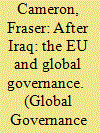

|
|
|
|
|
| Publication |
Apr-Jun 2004.
|
|
|
|
|
|
|
|
|
|
|
|
|
|
|
|
| 10 |
ID:
132170
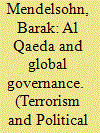

|
|
|
|
|
| Publication |
2014.
|
| Summary/Abstract |
In recent years, statements by al Qaeda leaders have included references to topics often associated with global-governance proponents' critique of the state. This article examines the organization's attitude toward symbols of global governance, giving particular attention to its view of the United Nations as the foundation for global governance, and to the manner in which al Qaeda approaches the central questions of environmental threats and human rights. The organization is seeking to insert itself into the discourse of global governance and use it in an instrumental manner; it focuses on anti-Western narrative and seeks to expose the existing order as designed by Western powers, particularly the United States, for self-serving reasons. However, the article argues, notwithstanding al Qaeda's reputation for sophistication in manipulating public opinion, the organization's references to global governance underscore the limitations its rigid ideology imposes on its messaging efforts. Even though adopting the global governance discourse is in line with the group's effort to improve its image, al Qaeda's extremist ideology limits its ability to take full advantage of the benefits this discourse offers.
|
|
|
|
|
|
|
|
|
|
|
|
|
|
|
|
| 11 |
ID:
142208
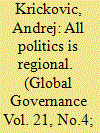

|
|
|
|
|
| Summary/Abstract |
Tip O'Neill famously claimed, “All politics is local.” As global governance falters and US leadership wanes, will “all politics” become regional with emerging powers (China, Russia, Brazil) taking responsibility for leadership at the regional level? While regional powers are providing effective leadership on free trade and financial stability, they have made much less progress on security issues where their approaches to certain problems, such as human security, diverge from those adopted by the West. Their ability to provide regional leadership is hampered by the increasing complexities of the modern world, including the conflicting dynamics of regionalism itself. The emergence of a centralized system of regional governance based on the hegemony of regional leaders is therefore unlikely. Instead, we are seeing the emergence of a complex and dynamic system of governance that includes a broad range of actors operating on multiple and overlapping levels.
|
|
|
|
|
|
|
|
|
|
|
|
|
|
|
|
| 12 |
ID:
100449
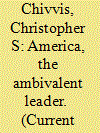

|
|
|
|
|
| Publication |
2010.
|
| Summary/Abstract |
Global governance still requires leadership that articulates a constructive, practical vision for international cooperation."
|
|
|
|
|
|
|
|
|
|
|
|
|
|
|
|
| 13 |
ID:
111937
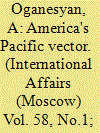

|
|
|
|
|
| Publication |
2012.
|
| Summary/Abstract |
"THE FUTURE OF POLITICS will be decided in Asia, not Afghanistan or Iraq, and the United States will be right at the center of the action," U.S. Secretary of State Hillary Clinton stated in her article which appeared in the November 2011 issue of Foreign Policy under a powerful title "America's Pacific Century." The Editors were even more explicit when they put "Our Pacific Century" on the cover.
The American diplomat has gone much further than mere statements of the region's impressive economic growth which shifted the center of world economy to Asia. She has made it clear that America intends to dominate the APR. Diplomatically the formula "America's Pacific Century" is highly ambiguous; placed in the context of the coming presidential elections it looks like a gauntlet thrown down to that part of the American opposition that talks about "coming home" to address the economic crisis and financial instability.
|
|
|
|
|
|
|
|
|
|
|
|
|
|
|
|
| 14 |
ID:
157594


|
|
|
|
|
| Summary/Abstract |
This article is a collective response to ‘Planet Politics’ by Anthony Burke et al., which was published in this journal in 2016, and billed as a ‘Manifesto from the End of IR’. We dispute this claim on the basis that rather than breaking from the discipline, the Manifesto provides a problematic global governance agenda which is dangerously authoritarian and deeply depoliticising. We substantiate this analysis in the claim that Burke et al. reproduce an already failed and discredited liberal cosmopolitan framework through the advocacy of managerialism rather than transformation; the top-down coercive approach of international law; and use of abstract modernist political categories. In the closing sections of the article, we discuss the possibility of different approaches, which, taking the Anthropocene as both an epistemological and ontological break with modernist assumptions, could take us beyond IR’s disciplinary confines.
|
|
|
|
|
|
|
|
|
|
|
|
|
|
|
|
| 15 |
ID:
083489
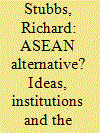

|
|
|
|
|
| Publication |
2008.
|
| Summary/Abstract |
Over the last 40 years ASEAN has developed a set of goals and norms with regard to the conduct of regional and international relations that provide an alternative paradigm to the dominant contemporary Western liberal approach to 'global' governance. ASEAN's alternative paradigm is rooted in Asia's cultures and the region's colonial and Cold War experiences. Using an historical institutionalist approach, the analysis details the paradigm's central features - the importance of neutrality; sovereignty and territorial integrity; the peaceful settlement of disputes; informal, non-confrontational negotiations; and the promotion of domestic stability and social harmony - which together underscore the importance of state autonomy and non-interference in the affairs of other states. The paradigm's influence in global affairs has increased markedly in recent years, most notably as the ASEAN-China linkage has matured and China has given its strong support to ASEAN's approach to the conduct of international relations. This turn of events suggests that the ASEAN paradigm presents a significant challenge to Western hopes for a common approach to 'global' governance.
|
|
|
|
|
|
|
|
|
|
|
|
|
|
|
|
| 16 |
ID:
065430
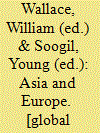

|
|
|
|
|
| Publication |
Tokyo, Council for Asia-Europe Corporation, 2004.
|
| Description |
xix, 188p.
|
| Standard Number |
4889070737
|
|
|
|
|
|
|
|
|
|
|
|
Copies: C:1/I:0,R:0,Q:0
Circulation
| Accession# | Call# | Current Location | Status | Policy | Location |
| 050094 | 327.17/WAL 050094 | Main | On Shelf | General | |
|
|
|
|
| 17 |
ID:
151384
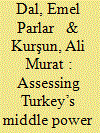

|
|
|
|
|
| Summary/Abstract |
This study attempts to identify possible new roles for intermediary actors in the changing global architecture by focusing on Turkey’s middle power capacity in the nascent middle power network of Mexico, Indonesia, South Korea, Turkey, Australia (MIKTA). It looks at an overarching embedded analytical triad of goals, means, and impact, superimposed over positional, behavioural, and ideational sublayers. It tests the assumption that the more a state holds together its middle power goals, means, and impact in a combined way, the more leverage it can have as a middle power in the changing international political economy. After reviewing the existing literature on middle powers, the first part of this paper outlines this embedded analytical framework. The second and the third parts seek to operationalize this framework, in particular at institutional and state levels in the example of MIKTA and Turkey. The fourth part delves into the opportunities and challenges that Turkey faces in its MIKTA trajectory (in the light of the conclusions drawn from the second and third parts). The study concludes that while Turkey possesses fairly compatible goals and impact with those of MIKTA, it is still far from channelling all of its capabilities to this new network due mainly to the domestic and regional impediments it faces—as well as the lack of a comprehensive roadmap in relation to MIKTA.
|
|
|
|
|
|
|
|
|
|
|
|
|
|
|
|
| 18 |
ID:
120823
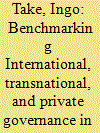

|
|
|
|
|
| Publication |
2013.
|
| Summary/Abstract |
The question of how to overcome the democratic deficits of global forms of governance has led to a pretentious academic debate. To proceed in theory-building, we need to assign systematically the theory-driven assumptions on legitimate forms of governance beyond the nation-state with the various, already observable forms of global governance. Thereto, the paper is aiming at a systematic comparative appraisal of the legitimatory quality of different patterns of governance by applying suitable indicators for their measurement. The innovative potential of this paper is the application of a structured, focused comparison that interconnects a multi-dimensional concept of legitimacy (input-, throughput- and outputdimension) with the triad of international, transnational and private forms of governance. As far as the chosen indicators show a legitimizing effect, they should serve as a standard for upcoming research studies and, by this, contribute to further systematization of studies on global governance. At least, the analysis of the constitutive criteria of cross-border governance arrangements in a legitimacy-based theoretical perspective shall also help to identify their discrete potential for legitimacy and indicate ways for their institutional safeguard and transformation to other arrangements. The conceptual outline will be completed by a case study on forest governance.
|
|
|
|
|
|
|
|
|
|
|
|
|
|
|
|
| 19 |
ID:
153261
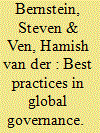

|
|
|
|
|
| Summary/Abstract |
Best practices are increasingly used to govern a range of global issues. Yet, the rise of global governance through best practices has received scant attention in the International Relations literature. How do best practices differ from other modes of governance? How are they constructed? And to what end? We offer a novel conceptualisation of best practices as a unique mode of global governance principally distinguished by basing claims of political authority on existing practices. Belying their apolitical terminology, best practices in global governance are purposively constructed by political actors to steer targeted actors toward desired ends. We illustrate the characteristics of governance through best practices with reference to state and non-state global governance initiatives in a wide range of issue areas, ranging from finance and development to human rights and the environment, and through an in-depth case study of the ISEAL Alliance, a disseminator of best practices for transnational sustainability standard-setters. We find that governance through best practices has both positive and negative consequences. While it offers a pragmatic approach to global governance under conditions of fragmentation and polycentricity, it can also mask underlying power dynamics and political agendas and therefore requires ongoing critical scrutiny.
|
|
|
|
|
|
|
|
|
|
|
|
|
|
|
|
| 20 |
ID:
113812


|
|
|
|
|
| Publication |
2012.
|
| Summary/Abstract |
Over recent decades a judicialization process of international dispute settlement procedures has taken place. Yet, the judicialization of procedures remains meaningless if the procedures are not used and accepted by disputing states in practice. Prominent theoretical approaches point to different conditions under which this is to be expected. Realism emphasizes the international distribution of power, institutionalism stresses the importance of the institutional design of international dispute settlement procedures, and liberalism points to the domestic institutional setting of the participating states. The article confronts these theoretical expectations with states' actual dispute settlement behavior in the international trade regime, the United Nations Security Council, the European human rights regime and the regime on the protection of endangered species in the 1970s/80s and 1990s/2000s, respectively. Its main finding is that, compared to realism and liberalism, institutionalism fares better in explaining the judicialization of states' dispute settlement behavior.
|
|
|
|
|
|
|
|
|
|
|
|
|
|
|
|
|
|
|
|
|